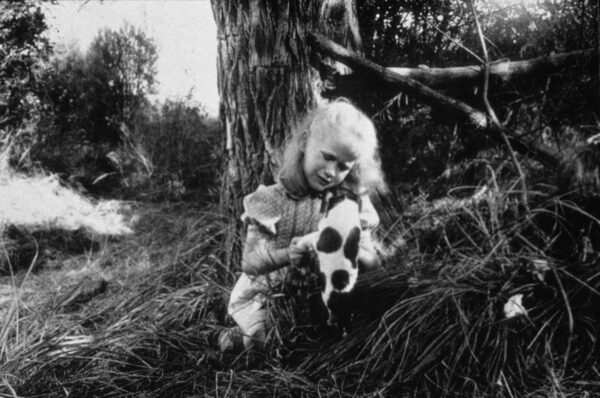“Forbidden Games” – a loss of innocence

Georges Poujouly and Brigitte Fossey in René Clément’s FORBIDDEN GAMES (1952). Courtesy: Rialto Pictures / Studiocanal
Very few films retain the patina of perfection over the decades and even fewer grow brighter over time. “Forbidden Games” (“Jeux Interdits”), a film by the French giant René Clément, is one of them. Originally released in 1952 and winner of the Best Foreign Language Oscar for 1953, among its many other awards, “Forbidden Games” is set in France as the Nazi invasion begins. Fearful of what will happen, more Parisians left the city than stayed and the roads were clogged with people fleeing in cars, carts and on foot.
Five-year old Paulette, in an outfit matching her mother’s, is oblivious to the chaos surrounding her. When her beloved dog Jock runs off, she dashes after him causing her terrified parents to drop everything and try to stop her. The road is strafed with machine gun fire and Paulette, holding Jock, is knocked to the ground by her protective parents who, along with the dog, are killed instantly. Paulette, dazed, rises, picks up the dog and follows a path along an adjacent stream. Reaching an open field, she encounters 11-year old Michel Dollé, a sympathetic peasant boy who immediately adopts her as one might a pet rabbit. He leaves the dog in the woods, promising her a new one, and leads her to his farm, entreating his parents to keep her. Already housing a couple of daughters and two adult sons, they nevertheless agree that they can’t immediately turn her out. She is, to them, an exotic creature with her clean hair and ironed frock.
The bond Michel and Paulette develop is far greater than the bond Michel, a bright child who, in a different family might have a future, feels for his own siblings. The Dollé family has a petty rivalry with their neighbors the Gouards, a constantly escalating war over the trivial only country peasants would exercise, whether it involves a trespassing dog or cutting grass on the wrong side of a fence. Resentment runs high over the enlistment of the Gouard’s eldest son and the draft dodging of their second oldest. Clément’s depiction of peasant society in France where jealousy and fear are primarily reserved for those within the village and Parisians are as foreign as Germans is brilliant and illuminating. The xenophobia that is still part of the fabric of French life had much of its origins in the countryside.
What Michel sees about Paulette’s situation, something the grown-ups seem to miss, is an attempt to understand death, most personified in the loss of her beloved dog. She has already indicated that she knows her parents are dead, but her loss of the dog has a more immediate and emotional impact. Together they embark on a journey to spiritualize loss by creating their own personal creature cemetery, burying and praying over Jock, a dead mole, several insects and other found animals. Imitating the rituals of adult deaths, they begin collecting crosses to adorn the plots in their cemetery. Their theft of crosses and crucifixes escalates when they steal the crosses adorning the graves of Madame Gouard and of Michel’s older brother. The consequences will be bitter for both children, whose innocence will have been shattered as much by death as by the bad faith of the adults around them.
Director Clément is the consummate observer. His film is as much about the consequences of World War II as it is about the loss of innocence. In both Brigitte Fossey (Paulette) and Georges Poujouly (Michel) he was able to uncover the joy, innocence and raw emotion of childhood. Their performances are extraordinary and among the best and most natural ever achieved on screen. This is filmmaking’s finest hour as there is no obvious plot, just a moment captured in time. We are drawn into their lives, hoping for a positive outcome knowing full well that in war there is no emotional winner. The scarring will last a lifetime made deeper by the adults’ actions.
Clément fully captured the flight from Paris described by Irene Némirovsky in Suite Française, written in 1942 but released posthumously in 2004. Robert Julliard fills the frame cinematographically with ominous clouds, terrifying war planes juxtaposed with peaceful pastures; Clément draws the emotional picture of panic, fear and distrust, all equally present in the country and city for reasons that are the same and different.
Inspired by Tárrega’s “Recuerdos de Alhambra, the score of the film was written by the virtuoso Spanish guitar player Narciso Yepes, and has remained an international best seller.
Emotionally gripping and unsentimental, there is a reason this superb film has remained an important influence and icon in international cinema. That it is being re-released, though for one week only, is a blessing. Do not miss it on the big screen. This is one for the ages.
In French with English subtitles.
Opening Friday, August 28 at the Nuart in West Los Angeles.



